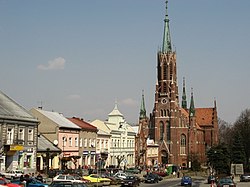Grybów
| Grybów | ||
|---|---|---|

St. Catherine's Church in Grybów
|
||
|
||
| Coordinates: 49°37′28″N 20°56′54″E / 49.62444°N 20.94833°E | ||
| Country |
|
|
| Voivodeship | Lesser Poland | |
| County | Nowy Sącz | |
| Gmina | Grybów (urban gmina) | |
| Government | ||
| • Mayor | Piotr Piechnik | |
| Area | ||
| • Total | 17 km2 (7 sq mi) | |
| Population (2006) | ||
| • Total | 6,025 | |
| • Density | 350/km2 (920/sq mi) | |
| Time zone | CET (UTC+1) | |
| • Summer (DST) | CEST (UTC+2) | |
| Postal code | 33-330 | |
| Car plates | KNS | |
| Website | http://www.grybow.pl | |
Grybów [ˈɡrɨbuf] (Ukrainian: Грибів, Hrybiv; German: Grünberg, Grynberk; Yiddish: גריבאוו, Gribuv), is a town in the Nowy Sącz County, in Lesser Poland Voivodeship of Poland, with 12,409 inhabitants (2005). It is located in the heartland of the Doły Jasielsko Sanockie (Doły Pits), and its average altitude is 370 metres above sea level, although there are some hills located within the confines of the city, Grybów has the steepest town square in medieval Europe.
The history of Grybów dates back to the Early Middle Ages in Poland, when the settlement belonged to the Castelany in Biecz under King Casimir III the Great of the Piast dynasty. The town charter was issued by Kazimierz on May 15, 1340 for Hanko Bogacz, following destruction caused by the Mongol invasion. The new town centre was erected on a hill at the site of former Biała village. At that time, Grybow was called Grynberg (see Walddeutsche).
Due to convenient location and several royal privileges, Grybow prospered and became a center of trade and cloth manufacturing. In the period known as Polish Golden Age, Grybow had a renowned school of sculptors, in which the figure of Madonna of Kruzlowa was made. During the catastrophic Swedish invasion of Poland (1655 - 1660) Grybow was captured by Swedes, who looted the town, and then set it on fire, together with ancient parish church and nearby castle. Swedish raid was followed by a Transilvanian invasion of 1657, which brought further destruction. Furthermore, there were frequent fires and outbreaks of plague, and by the late 17th century, Grybow turned into a small, poor town. In the summer of 1768, the area of the town witnessed Polish - Russian fighting, during the Bar Confederation.
...
Wikipedia


